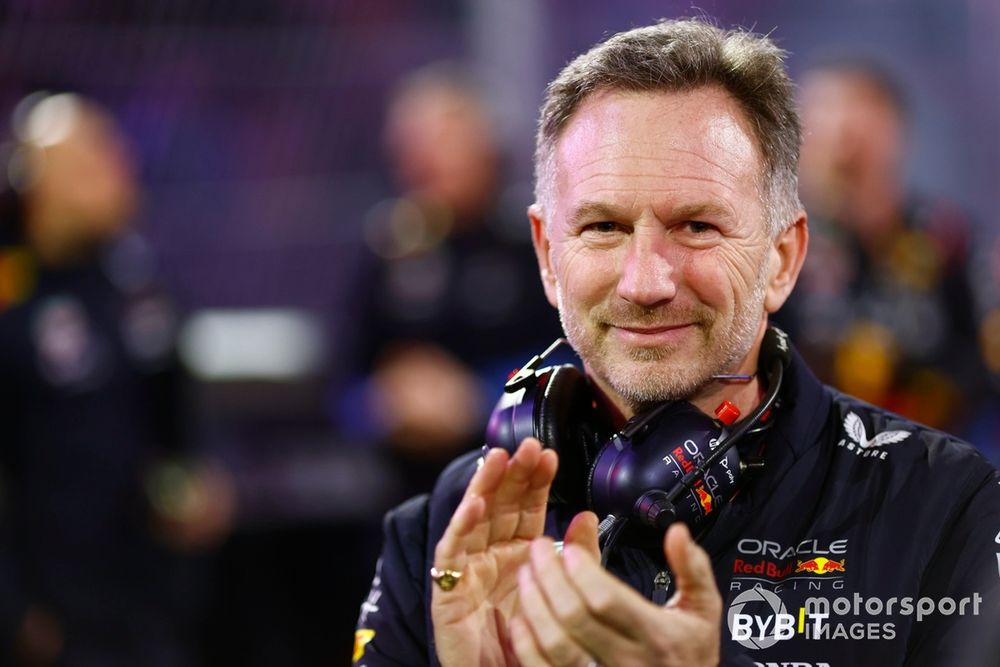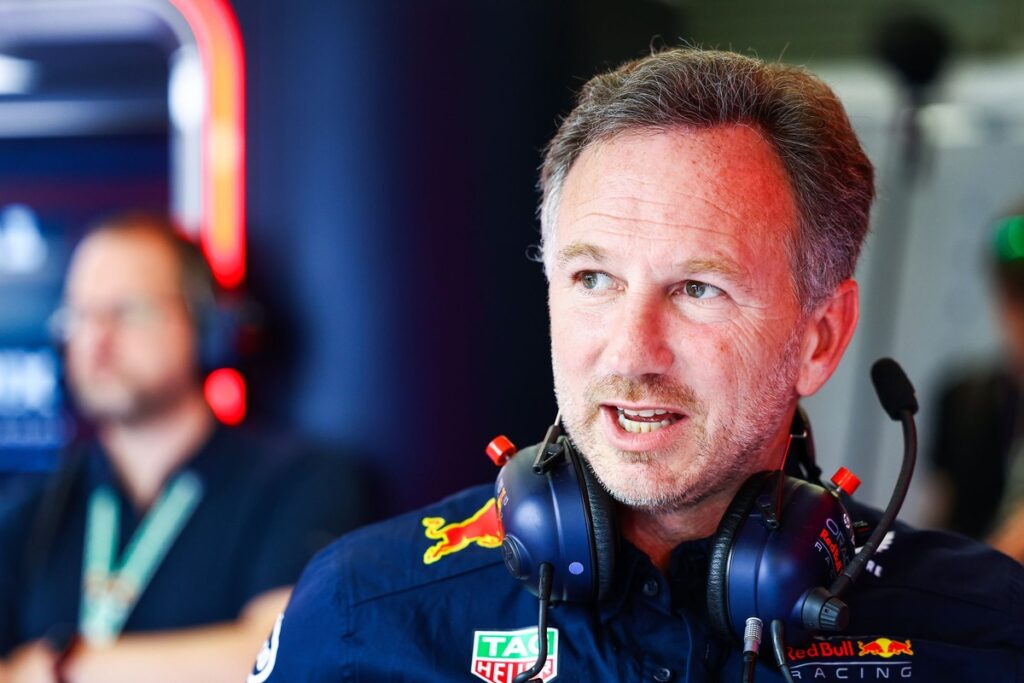On Wednesday, Red Bull made the decision to part ways with its Formula 1 team principal of more than 20 years, Christian Horner, replacing him with Racing Bulls boss Laurent Mekies.
The call was made as Red Bull’s F1 struggles keep worsening, with Max Verstappen now realistically out of the 2025 title fight and potentially exploring other avenues for the future, while the second car has been consistently failing to score big points, regardless of who drives it.
Will Horner’s departure and Mekies’ arrival provide Red Bull with the means to bounce back for F1’s new era in 2026? Our writers have their say.
Yes, but he should have gone sooner – Owen Bellwood
Christian Horner, Red Bull Racing
Photo by: Sam Bagnall / Motorsport Images
Red Bull is not the dominant force it once was in F1; it isn’t even the dominant force it was in this era of regulations.
After the highs of 2023 when the team won all but one race in F1, the outfit is now scrapping to reach the podium with one car, and fighting to finish every race with the other. How the mighty have fallen.
The blame for this decline can fall on any number of desks at Red Bull’s Milton Keynes HQ, but the buck, ultimately, stops with the man in charge. Christian Horner oversaw the team as it haemorrhaged talent, dropped down the rankings and became embroiled in off-track drama after off-track drama.
The writing was on the wall for Horner, so his ‘shock’ departure from the team wasn’t, actually, all that shocking. However, Red Bull electing to sack its boss mid-way through a pivotal season in a similar manner to how Horner treats his drivers is sure to rock the boat.
With the team struggling to find its form, rumours of Max Verstappen’s exit circling and just two races remaining before F1’s summer break, stability is needed if Red Bull hopes to salvage its season and set itself up for F1’s sweeping new regulations next year. Really, he should have gone months ago.
Now was as good a time as any – Stuart Codling

Christian Horner, Team Principal, Red Bull Racing, on the grid
Photo by: Sam Bloxham / Motorsport Images
Among the less controversial pronouncements to issue forth from Enoch Powell’s mouth was the maxim that all political careers end in failure – although in the modern world they generally end in self-aggrandising memoirs, but I digress.
Christian Horner’s ousting from Red Bull was a long time coming, but it has been in the works since Dietrich Mateschitz died in October 2022. No matter how neatly a great figure leaves their affairs, any regime change brings an orgy of score-settling and petty politics in its wake.
Indubitably Horner was pivotal in turning the shell of Jaguar Racing, long a laughing stock in Formula 1, into a competitive and hyper-motivated winning machine. And yet he was always needlessly – if quietly – resentful of Helmut Marko’s presence as Mateschitz’s minister without portfolio.
Long periods of success can breed complacency or, worse, hubris. Red Bull’s success came through teamwork and, as key contributors to that team left, Horner tried to convince the world they were expendable and easily replaceable.
As Julius Caesar discovered, you can cross the Rubicon as a conqueror but ere long you find yourself saying “Et tu, Brute?” as the many knives slip in. Red Bull is well into its decadent phase, the competitive rot has set in, and what’s required is a reset.
It may as well start now.
It is 18 months too late – Mark Mann-Bryans
Christian Horner, Red Bull Racing
Photo by: Red Bull Content Pool
It felt inevitable at the time of the ‘scandal’ that rocked Red Bull last winter that Christian Horner would ultimately lose his job.
He somehow survived, despite powerful people in and around Red Bull wanting him out – but the team, as well as the company as a whole, looked to move on without ever truly being able to move past it.
In all honesty, performances on track probably kept some of the pressure away from Horner at the start of 2024 and, with Max Verstappen still delivering a drivers’ championship despite Red Bull being surpassed by McLaren and Ferrari, the team boss had ridden out the worst of the fallout.
Those allegations have hung over Horner like the sword of Damocles ever since, and it would be difficult to imagine the whole airing of dirty laundry in public still did not play some part in his hasty exit from Red Bull.
While he garnered enough internal support at the time, given Horner has now been pushed out, it feels like it was a missed opportunity to move forward 18 months ago, when there was also still plenty more time to prepare for 2026 and beyond.
Harm of internal power struggles is already done – Ronald Vording
Max Verstappen, Red Bull Racing, Christian Horner, Team Principal, Red Bull Racing, Helmut Marko, Consultant, Red Bull Racing, Jos Verstappen
Photo by: Sam Bloxham / Motorsport Images
If people within the Red Bull company felt getting rid of Christian Horner would be necessary for unity and peace in the F1 team, then there is something to say in favour of this move. But in the grand scheme of things, it won’t change much, and the timing of it remains strange – to put it mildly.
Laurent Mekies has a wealth of experience in different organizations and is a more than capable team principal, but most likely his promotion won’t have much of an effect short-term. The RB21 is the main problem, and with focus behind the scenes already on next year, that car will remain a problem for the second half of 2025. Both world titles are simply gone.
For 2026 a lot depends on Red Bull’s engine project, meaning the Horner-Mekies change won’t have much of an effect on on-track performance anytime soon. It’s aimed at long-term success, but in that regard, harm is already done. Key personnel including Adrian Newey, Rob Marshall, Jonathan Wheatley and Will Courtenay have left or will leave the team, and those people are not easy to replace, no matter who is in charge. It means that the internal power struggles have already done a lot of damage to Red Bull, and part of that damage might be beyond repair.
Red Bull was respectful, and its decision makes sense – Oleg Karpov
Christian Horner, Team Principal, Red Bull Racing with the team
Photo by: Red Bull Content Pool
The fact that this has happened now – and not 18 months ago – is ultimately a positive for Christian Horner himself. It’s not a happy ending, but even though the decision came unexpectedly, Red Bull’s communication was at least respectful: acknowledging his achievements and recognising his place in the team’s history. Had it happened in the immediate aftermath of the scandal a year and a half ago, the background would have been very different.
Being sacked then – and effectively because of allegations of inappropriate behaviour – wouldn’t have left the door open for Horner to return to F1 with a different team. And putting the moral aspects of that story aside, because we’ll probably never know the full truth, that would’ve done him a disservice. Instead of becoming a sort of persona non grata, the current conversation is whether he could be a fit for a leadership role elsewhere, with names like Ferrari or Cadillac already being floated. He’s leaving now with performance cited as one of the main reasons, which is at least open to debate. His team has still won two races this year, and his lead driver was in the title fight, at least early in the season. Red Bull’s 2025 decline could still be seen as a blip.
Whether this is the right move for Red Bull is simply a matter of the board recognising the need for a fresh start. The “dream team” that brought Red Bull its success hasn’t only just started to fall apart – the unravelling began over a year ago with the departure of several senior figures. Red Bull needs to reinvent itself, and it’s understandable if the board feels that process also requires a new team principal.
In this article
Be the first to know and subscribe for real-time news email updates on these topics
Subscribe to news alerts
Read the full article here

